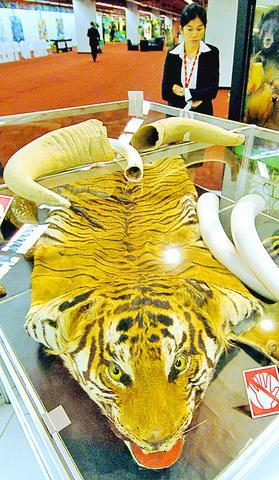Wildlife conservationists are expected to push for new trade restrictions to protect fast-disappearing animals and plants, while lobbyists try to free up commerce in some species at international talks starting yesterday in Bangkok.
The two-week conference brings together thousands of delegates from the 166 countries that have signed the UN Convention on International Trade in Endangered Species of Wild Fauna and Flora, or CITES.

PHOTO: AP
The voluntary agreement, introduced in 1975, is meant to protect about 30,000 animals and plants, some of which are threatened with extinction due to commercial trade. About 50 proposals are expected to be submitted during the meeting to legitimize or block trade in some species.
Environmentalists say wildlife sales generate billions of dollars annually, making it the world's third-largest illicit enterprise after drug trafficking and illegal arms sales.
About 150 activists protested outside the conference hall yesterday, demanding the return of Thai elephants sold to zoos abroad and Indonesian orangutans allegedly smuggled into Thailand for use in boxing matches to entertain tourists at a local wildlife park.
Namibia is expected to propose lifting a 1989 ban on the sale of ivory that would allow it to sell tusks, ivory trinkets and goods made from the hair and skin of elephants that had died naturally or were culled under government-supervised programs.
Kenya and several West and Central African nations have opposed the idea, calling for a 20-year extension of the current moratorium.
Kenya is also lobbying for a global ban on trade in lion trophies and skins, arguing that the animals have declined sharply in number due to hunting, loss of habitat and lack of prey.
Australia and Madagascar are expected to call for tighter restrictions on trade in great white sharks -- the massive ocean predator that has increasingly become the prey of traders and trophy hunters seeking its jaws, teeth, skin and meat. The US has backed the proposal.
Meanwhile, activists have denounced a proposal by Japan to allow some populations of minke whales to be hunted for scientific purposes. Japan is among a few countries that have continued to hunt the mammals despite a 1986 ban on commercial whaling that largely halted the practice.
Thailand will ask delegates to outlaw trade of the Irrawaddy dolphin, which is native to freshwater habitats in Southeast Asia and is sought after by zoos, particularly in Japan and Singapore, for its pleasing appearance and ability to perform tricks.
While Thailand has made strides in cracking down on illicit wildlife trade in recent years, the country remains a hub for the sale and export of protected species due to corruption and weak law enforcement. Bangkok will ask for greater latitude in selling farm-grown orchids, a lucrative export. Wild specimens of the flower have been over-harvested worldwide because of their popularity among collectors, according to the UN.
Among the aquatic species set to be debated at the conference is the humphead wrasse, a Pacific reef fish considered a delicacy in some countries.
Proposals to protect the ramin timber tree, the Chinese yew and other medicinal plants, as well as an array of bird, turtle, crocodile and rhinoceros species will also be considered.

A fire caused by a burst gas pipe yesterday spread to several homes and sent a fireball soaring into the sky outside Malaysia’s largest city, injuring more than 100 people. The towering inferno near a gas station in Putra Heights outside Kuala Lumpur was visible for kilometers and lasted for several hours. It happened during a public holiday as Muslims, who are the majority in Malaysia, celebrate the second day of Eid al-Fitr. National oil company Petronas said the fire started at one of its gas pipelines at 8:10am and the affected pipeline was later isolated. Disaster management officials said shutting the

US Vice President J.D. Vance on Friday accused Denmark of not having done enough to protect Greenland, when he visited the strategically placed and resource-rich Danish territory coveted by US President Donald Trump. Vance made his comment during a trip to the Pituffik Space Base in northwestern Greenland, a visit viewed by Copenhagen and Nuuk as a provocation. “Our message to Denmark is very simple: You have not done a good job by the people of Greenland,” Vance told a news conference. “You have under-invested in the people of Greenland, and you have under-invested in the security architecture of this

Japan unveiled a plan on Thursday to evacuate around 120,000 residents and tourists from its southern islets near Taiwan within six days in the event of an “emergency”. The plan was put together as “the security situation surrounding our nation grows severe” and with an “emergency” in mind, the government’s crisis management office said. Exactly what that emergency might be was left unspecified in the plan but it envisages the evacuation of around 120,000 people in five Japanese islets close to Taiwan. China claims Taiwan as part of its territory and has stepped up military pressure in recent years, including

UNREST: The authorities in Turkey arrested 13 Turkish journalists in five days, deported a BBC correspondent and on Thursday arrested a reporter from Sweden Waving flags and chanting slogans, many hundreds of thousands of anti-government demonstrators on Saturday rallied in Istanbul, Turkey, in defence of democracy after the arrest of Istanbul Mayor Ekrem Imamoglu which sparked Turkey’s worst street unrest in more than a decade. Under a cloudless blue sky, vast crowds gathered in Maltepe on the Asian side of Turkey’s biggest city on the eve of the Eid al-Fitr celebration which started yesterday, marking the end of Ramadan. Ozgur Ozel, chairman of the main opposition Republican People’s Party (CHP), which organized the rally, said there were 2.2 million people in the crowd, but